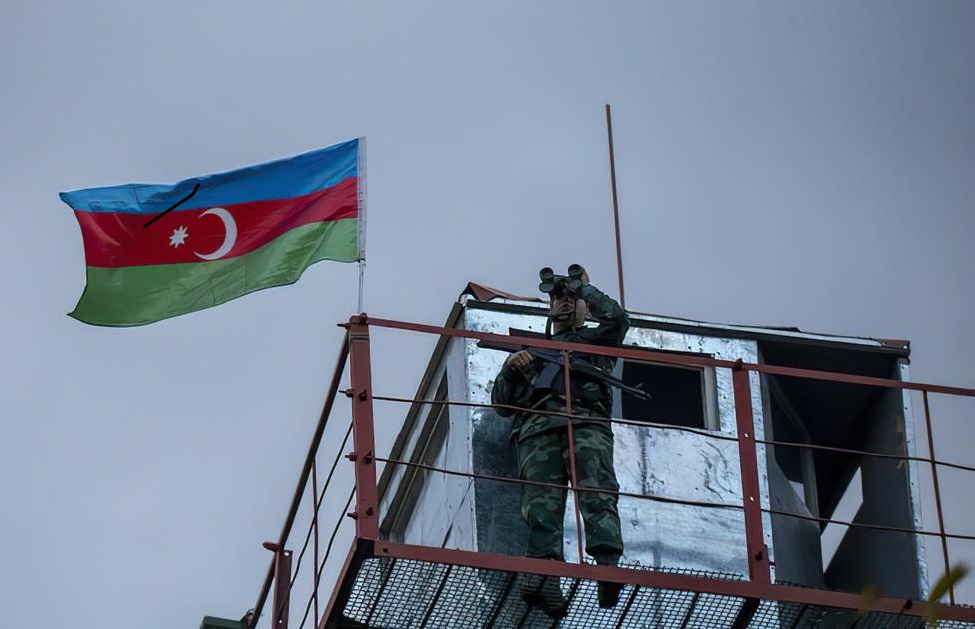The State Border Service of Azerbaijan reported an incident perpetrated by the Armenian soldiers at the Armenia-Azerbaijan state border on Wednesday.
According to a statement released by the service on Thursday, Armenian soldiers opened fire on the positions of Azerbaijan’s State Border Service units stationed in the liberated Zangilan district, as well as the positions of the Russian border guards deployed on the Armenian side of the border.
“Russian border guards appealed to their Azerbaijani counterparts about the incident, saying that the perpetrators were drunk and asked not to retaliate,” the statement reads. “Taking into account the request of the Russian side, the Azerbaijani border guards showed restraint and did not retaliate. After the incident, the Azerbaijani side was informed about the expulsion of the provocative Armenian servicemen from the area."
In another incident that took place on the same day, a group of Armenians moving toward the Armenia-Azerbaijan state border in Azerbaijan’s liberated Gubadli district with a convoy of up to 40 vehicles shouted anti-Azerbaijan slogans trying to stir up tensions.
The State Border Service of Azerbaijan vowed a harsh response should a similar provocative incident happen in the future.
Currently, a ceasefire is in effect between Armenia and Azerbaijan as a result of the end of a 44-day-long war in the latter’s Karabakh region last year. The tripartite agreement, signed by these two states and Russia on November 10, 2020, calls for a complete ceasefire and cessation of hostilities.
Armenia and Azerbaijan have been at odds for decades over the Nagorno-Karabakh (Daghlig Garabagh) region, which is an internationally recognized territory of Azerbaijan. In 1991, Armenia kicked off military operations against Azerbaijan to occupy the region. The full-scale war lasted until a ceasefire was reached in 1994. As a result, Armenia occupied 20 percent of Azerbaijan’s internationally recognized territories – the Nagorno-Karabakh region and seven surrounding districts.
Over 30,000 ethnic Azerbaijanis were killed and one million others were expelled from their homes in a brutal ethnic cleansing policy conducted by Armenia. Although the UN Security Council adopted four resolutions in 1993 demanding the immediate withdrawal of the occupying forces from the Azerbaijani lands and the return of internally displaced Azerbaijanis to their native lands, Armenia failed to comply with all four legally binding documents.
The latest outbreak of war in the region started on September 27, 2020, after Armenia's forces deployed in the occupied Azerbaijani lands shelled military positions and civilian settlements of Azerbaijan. As a result of counter-offensive measures, the Azerbaijani army liberated over 300 settlements, including five major cities from Armenia's occupation.
Russia mediated the signing of the ceasefire between Armenia and Azerbaijan on November 10, 2020. Armenia also returned the occupied Aghdam, Kalbajar, and Lachin districts to Azerbaijan by December 1 as part of the obligations it took under the ceasefire deal.
However, the ceasefire proved to be fragile after two consecutive deadly breaches by armed Armenian gangs in Azerbaijan’s liberated Khojavend district in December 2020. Four Azerbaijani servicemen and a civilian were killed in the wake of Armenians' subversions and terrorist attacks after the ceasefire deal was signed, which prompted the Azerbaijani army to launch a counter-terrorist operation.
More than 60 armed saboteurs were captured by Azerbaijani forces. Although Armenian authorities and diaspora have tried to label them as prisoners of war, the Azerbaijani side calls them terrorists due to their encroachment on the positions of Azerbaijan after the war ended.







 Russian Foreign Minister Sergei Lavrov has reasserted that Moscow has no intentions to stop the fighting in Ukraine, even if peace talks commence.
Russian Foreign Minister Sergei Lavrov has reasserted that Moscow has no intentions to stop the fighting in Ukraine, even if peace talks commence.
 Iran has refuted reports of alleged damage to Shimon Peres Negev Nuclear Research Centre located southeast of Dimona, Israel, during the recent air...
Iran has refuted reports of alleged damage to Shimon Peres Negev Nuclear Research Centre located southeast of Dimona, Israel, during the recent air...
 Iran’s Foreign Minister, Hossein Amir-Abdollahian, has labeled a foiled Israeli drone attack in certain parts of the country as a "failure" for Isr...
Iran’s Foreign Minister, Hossein Amir-Abdollahian, has labeled a foiled Israeli drone attack in certain parts of the country as a "failure" for Isr...



